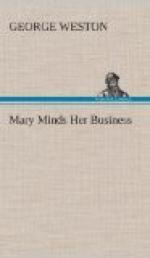Steadily and surely the places left vacant by the men were filled with women, naturally deft of hand and quick of eye; but the more apparent it became that the third phase of the strike was being lost by the men, the more worried Archey looked—the oftener he peeped into the future and frowned at what he saw there.
“The next thing we know,” he said to Mary one day, “every man on the place will walk out, and what are we going to do then?”
She told him of the reporter’s suggestion.
“A good idea, too,” he said. “If I were you, I’d start advertising in those other cities right away, and get as many applications on file as you can. Don’t just ask for women workers. Mention the kind you want: machine tool hands, fixers, tool makers, temperers, finishers, inspectors, packers—I’ll make you up a list. And if you don’t mind I’ll enlarge the canteen, and change the loft above it into a big dining room, and have everything ready this time—”
A few days later Spencer & Son’s advertisement appeared for the first time outside of New Bethel, and soon a steady stream of applications began to come in.
Although Mary didn’t know it, her appeal had a stirring note like the peal of a silver trumpet. It gripped attention and warmed imagination all the way from its first line “A call to women” to its signature, “Josiah Spencer & Son, Inc. Mary Spencer, President.”
“That’s the best yet,” said Archey, looking at the pile of applications on the third day. “I sha’n’t worry about the future half as much now.”
“I don’t worry at all any more,” said Mary, serene in her faith. “Or at least I don’t worry about this,” she added to herself.
She was thinking of Helen again.
The night before Helen had come in late, and Mary soon knew that she had been with Burdon. Helen was quiet—for her—and rather pale as well.
“Did you have a quarrel?” Mary had hopefully asked.
“Quarrel with Burdon Woodward?” asked Helen, and in a low voice she answered herself, “I couldn’t if I tried.”
“... Do you love him, Helen?”
To which after a pause, Helen had answered, much as she had spoken before, “I only wish he had half of Wally’s money....” And would say no more.
“I have warned her so often,” said Mary. “What more can I say?” She uneasily wondered whether she ought to speak to her aunts, but soon shook her head at that. “It would only bother them,” she told herself, “and what good could it do?”
Next day at the factory she seemed to feel a shadow around her and a weight upon her mind.
“What is it?” she thought more than once, pulling herself up short. The answer was never far away. “Oh, yes—Helen and Burdon Woodward. Well, I’m glad she’s going out with Wally today. She’s safe enough with him.”
It had been arranged that Wally should drive Helen to Hartford to do some shopping, and they were expected back about nine o’clock in the evening. But nine o’clock, ten o’clock, eleven o’clock and midnight came—and still no sign of Wally’s car.




